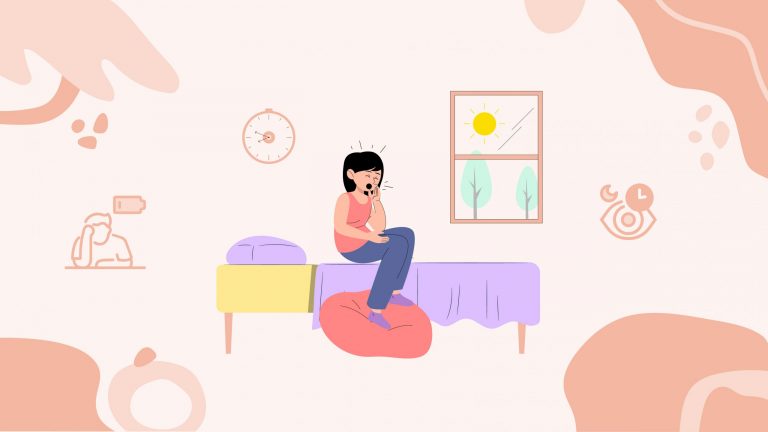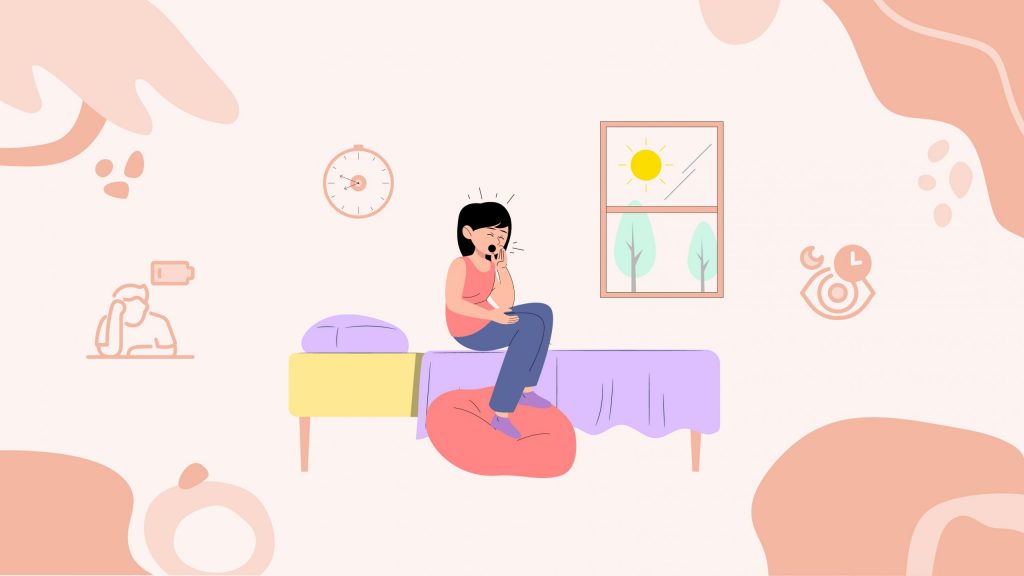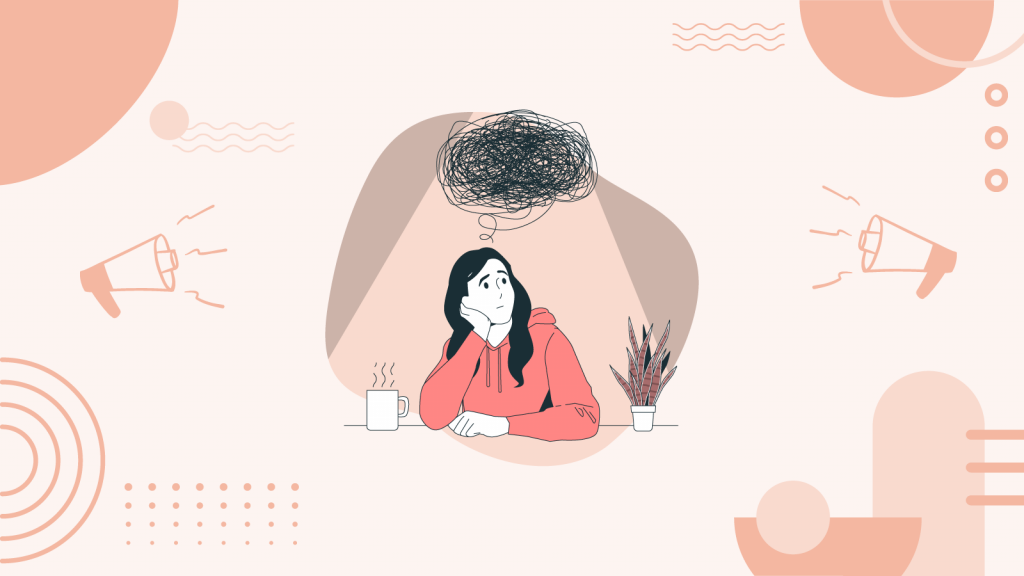“Each morning feels like a burden, not ready to leave the bed; pushing hard to keep up, melting through the fog in my head.”
How awful does it feel to wake up in the morning with a tired body and mind? It’s as if your body never stopped working during the night, leaving you completely drained of energy.
Waking up tired in the morning is a frustrating experience that disturbs your entire day. You try hard to have a good night’s sleep by going to bed on time, avoiding caffeine a few hours before bed, and creating a comfortable environment to sleep. However, you are still tired every morning.
If this is something really affecting your life and health, then it is essential to understand the causes and take the necessary steps.
Let’s learn more about why you are always tired in the morning and how simple lifestyle changes can help you feel more refreshed and ready to tackle your daily struggles.
Common Causes of Morning Fatigue
It is not usual to wake up exhausted in the morning, and several factors could be responsible for this. Here are some of the root causes of your morning fatigue:
#1: Sleep Disorders You Might Not Be Aware Of
One of the most common causes of morning fatigue is sleep disorders, such as sleep apnea, insomnia, or restless leg syndrome. These conditions can interrupt your sleep cycles, and you might not even notice them. They also prevent your body from entering deep sleep stages, keeping your body tired the next morning.
#2: Your Sleep Environment Isn’t As Relaxing As You Think
You might not have the sleep environment required for quality sleep, and a lot depends on it. You must ensure your bedroom is dark, quiet, and cool enough. Even the slightest disturbance, like a flickering light or the hum of a fan, can interrupt your REM cycles. If you are constantly waking up during the night, it is essential that you make some adjustments to your sleep environment for better and deeper sleep.
#3: Stress and Anxiety Are Messing With Your Sleep
You might have often noticed that your brain keeps replaying the events of the day or worries about tomorrow when you try to sleep. You might have disturbed sleep patterns due to mental health issues like stress, anxiety, or even depression.
👉 Pro Tip
Try keeping a sleep journal for a week, noting your pre-sleep activities, thoughts, and sleep quality each morning. This can help you identify patterns or triggers that contribute to your morning fatigue.
It’s reported that nearly 1 in 5 people experience poor sleep due to stress, indicating that mental well-being is closely tied to sleep quality.
#4: Your Lifestyle Choices Could Be the Real Problem
Things you do during the day impact how you sleep at night. For example, you could drink caffeine in the evening, eat heavy meals late at night, or work out before bed, all of which can interfere with your body’s natural circadian rhythms. So, it becomes essential to evaluate your daily habits to identify what’s causing the real problem.
Why is Quality Sleep Important?
You might think that sleeping for eight hours is enough even when the quality of sleep is poor, keeping you tired when you wake up. However, quality sleep is crucial for your mental and physical health.
Here are some of the points for you to understand the importance of healthy sleep for your overall health:
- Your Body Needs It to Function at Its Best
When you are in deep sleep, your body performs essential maintenance functions such as repairing cells and strengthening your immune system. Not having quality sleep interrupts these processes, leaving you feeling drained and making it hard to handle the day ahead. Chronic sleep deprivation is also linked to an increased risk of conditions like obesity, heart disease, and diabetes.
- Your Brain Uses Sleep to Recharge
Sleeping is not just rest for your body but also a process of cleaning up your brain. During sleep, your brain collects memories, processes emotions, and clears out waste products collected throughout the day. Not having enough sleep will affect your cognitive functions, making it harder for you to concentrate, remember things, and manage emotions.
🎭 Interesting Fact
Your body’s cells regenerate the fastest during deep sleep, which is why quality rest is often called “nature’s best healer.” This regeneration plays a key role in maintaining not just your physical health but also your mental well-being.
A study revealed that people who regularly get less than 7 hours of quality sleep are more prone to experiencing mood swings and anxiety.
- Hormonal Balance Depends on Restorative Sleep
Sleep has a direct impact on hormone regulation in your body. Poor sleep affects the production of hormones like cortisol (a stress hormone) and serotonin (a mood stabilizer). Due to this imbalance, you will feel more stressed and irritable, creating a never-ending cycle of stress leading to poor sleep.
Lifestyle Changes to Improve Your Sleep Quality
If you are wondering how to improve your sleep quality by changing your lifestyle, here are some of the simple changes that can help you feel more rested:
#1: Create a Consistent Sleep Schedule
Your body has a natural clock called the circadian rhythm, which makes it essential to sleep consistently. It is important to go to sleep and wake up at the same time every day, even on weekends, to regulate this rhythm and improve your sleep naturally when it is time to wind down and when it is time to wake up, giving you more restful sleep.
#2: Develop a Relaxing Pre-Bedtime Routine
Engaging in relaxing activities before bed signals your body that it’s time to sleep. You can practice meditation, reading, or a warm bath to relieve stress and prepare your mind for restful sleep. Avoiding habits that disrupt your sleep patterns, like using electronic devices, becomes essential as these devices emit blue light that can interfere with your body’s ability to produce melatonin, the sleep-inducing hormone.
#3: Watch What You Eat and Drink
Including a balanced diet in your meals plays an important role in your sleep quality. You must avoid heavy or spicy meals before bed and limit your caffeine and alcohol intake in the evening, as caffeine can stay in your system for up to 8 hours. Alcohol may initially make you drowsy and disturb your sleep later in the night. If you are having difficulty falling asleep, you can also try some sleep supplements to regulate your sleep schedule.
#4: Optimize Your Sleep Environment
It is essential to create the best sleeping environment for a good rest. You must keep your room cool, dark, and quiet. You can invest in a comfortable mattress and pillows to support your preferred sleeping position. You can also use blackout curtains, an eye mask, or a white noise machine to enhance your sleep environment and help you rest.
#5: Exercise, But Not Right Before Bed
Incorporating regular physical exercise into your daily routine can help you fall asleep faster and enjoy deeper sleep. However, if you exercise too close to your bedtime, it can disturb your sleep. For a restful sleep, finishing your workout at least a few hours before going to bed is important so that your body has enough time to relax.
Mindful Question
When was the last time you truly listened to your body’s signals for rest? How might adjusting your bedtime habits to honor those signals change the way you experience sleep?
You can make these changes to your lifestyle and habits to have a peaceful sleep and wake up energized every morning.
Conclusion
Nobody likes to wake up tired in the morning, as it affects the entire day’s routine. Starting your day with low energy brings challenges and makes it difficult to deal with the stress that comes along with your work and environmental situations.
Several factors might be responsible for your morning fatigue, from your underlying sleep disorders to lifestyle habits, impacting your sleep quality. It is important to understand the root cause and take the necessary steps to improve sleep quality.
You can start by improving your sleep environment, managing stress, and changing your daily routine to have a peaceful sleep and wake up refreshed.
According to studies, nearly 1 in 3 adults aren’t getting enough sleep regularly, so you’re not alone in this struggle.
It is essential to take charge of your sleep habits to have a positive impact on your mind and body, making your life more energized and powerful.
“Happy mornings, energy flowing through the body; a good sleep awakens the soul, setting the spirit free.”
Activity: Your 3-Night Sleep Reset Routine
- For the next three nights, set aside 30 minutes before bed to create a calming wind-down routine.
- Turn off all electronic devices and dim the lights to signal your body that it’s time to relax.
- Choose a soothing activity like reading, light stretching, or deep breathing exercises during this time.
- Pay attention to how your body and mind respond as you follow this routine.
- After the three nights, reflect on how this wind-down practice affects your sleep quality and morning energy levels.























